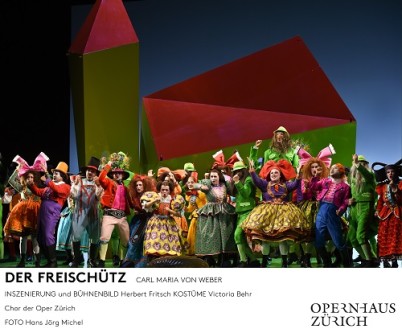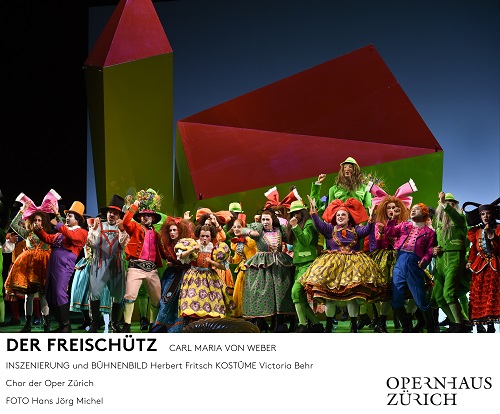 Switzerland Weber, Der Freischütz: Soloists, Philharmonia Zurich, Marc Albrecht (conductor), Zurich Opera, Zurich. 18.9.2016. (JR)
Switzerland Weber, Der Freischütz: Soloists, Philharmonia Zurich, Marc Albrecht (conductor), Zurich Opera, Zurich. 18.9.2016. (JR)

Production:
Production, video and set – Herbert Fritsch
Costumes – Victoria Behr
Lighting – Torsten König
Chorus-master – Jürg Hämmerli
Dramaturgy – Claus Spahn
Cast:
Fürst Ottakar – Oliver Widmer
Kuno – Pavel Daniluk
Agathe – Lise Davidsen
Ännchen – Mélissa Petit
Kaspar – Christof Fischesser
Max – Christopher Ventris
A hermit – Wenwei Zhang
Kilian – Yuriy Tsiple
Samiel – Florian Anderer
First huntsman – Benjamin Mathis
Second huntsman – Sebastian Zuber
Der Freischütz is considered the first important German Romantic opera and listening to it, it’s easy to hear why it inspired Wagner and Berlioz. It is not often performed outside Germany (where it is regularly performed), probably because there is much spoken German dialogue. The story is the stuff of German legend; a forester (Max), in love with his boss’ daughter (Agathe) falls under the influence of Kaspar who has sold his soul to the Devil (here in the shape of Samiel). Max is a poor marksman. Kaspar tells Max he can win Agathe’s love at the imminent shooting contest with the aid of magic bullets (Freikugel), which however (unbeknown to Max) can only be supplied by the Devil. He is also not told that the last bullet is under the Devil’s control and sure enough, when the time comes, it misses the target and hits Agathe. Luckily she is only slightly wounded, the shot is deflected and kills Kaspar. There’s a happy end when the young couple are united.
The singers were all first-rate. Christoph Fischesser as Kaspar was recovering from bronchitis and a replacement was in the wings but was happily not used. Fischesser was a bit below par and looked rather sorry for himself at the curtain call, but he has such a lovely voice, he was excused. In fact, few would have noticed anything wrong with him.
I was most impressed by Lise Davidsen, of towering stature, and fine strong dramatic voice, in all registers; she came to attention last year when she won a singing prize in Norway and already she is booked for Glyndebourne, Covent Garden, Aix-en-Provence and Vienna (to mention but a few!). Remember the name.
Christopher Ventris is a well-known name; the part of Max suits him, though he was not served by a very silly production (about which, more anon).
Pavel Daniluk and Oliver Widmer are Zurich regulars and provided solid support. Ear-catching and eye-catching was Mélissa Petit, a fairly recent addition to the Zurich Opera ensemble; she sang a fine Ännchen. Other minor parts were well taken, particularly Wenwei Zhang as the Hermit. The two huntsmen who have a “solo” speaking part in Act III amused the audience with their local Swiss-German dialect.
Continuing with the positives, Marc Albrecht in the pit was simply superb, whipping up the orchestra when required to almost fever pitch and the orchestra duly responded with a high-voltage performance. Special mention, as in the programme, must go to Karen Forster’s gorgeous viola solo. The chorus, particularly the men, were in fine lusty voice and enjoyed Weber’s wonderful melodies.
The production is problematic, to say the least. I appear to have been fortunate to have missed Purcell’s King Arthur last season but the notices for that were almost unanimously poor. Apparently in Herbert Fritsch’s production, the comedy (if one could call it that) bordered on the vulgar, annoying and puerile. I was hoping that lightning never strikes twice but was to be disappointed.
On the plus side, the Freischütz set was striking and inventive, a Lyonel Feiniger church in primary colours which came apart for the tame Wolf’s Glen scene and swivelled to show Agathe’s house. Lighting was attractive. Fritsch’s video of psychedelic shooting targets shown during the entire Overture, whilst apt, was too long and migraine-inducing.
The costumes were a riot of colour. The huntsmen and their wives were wacky country bumpkins, Worzel Gummidge scare-crow look-a-likes, the hermit (descending from heaven) was an oversize Wicker Man made of straw, Max was in black leathers with Austrian embroidery; only Agathe was allowed some attractive though over-sized costumes and gorgeous floral head-dresses. Ännchen looked like something out of Alice in Wonderland.
Fritsch dispensed with guns, instead the chorus went “bang” (or “peng” in German). The painting of one of Cuno’s ancestors, which is supposed to fall off the wall twice, was also removed – Fritsch says in the programme notes, that such extras are unnecessary! The worst excess was reserved for Samiel, dressed entirely in red. His constant visual grimaces and (impressive) acrobatics were a distraction and an embarrassment to one and all. Florian Anderer is a regular Fritsch collaborator but his comedic acting descended into the silliest slapstick (bumping into walls, falling over). The singers’ dialogue was delivered in Monty Python voices. The Germans should leave comedy to the Brits.
At the curtain call, the singers received warm applause; the conductor in particular was greeted with rousing cheers. When Herbert Fritsch emerged, in an orange suit, the boos outnumber the cheers by about 5 to 1 – which says it all!
John Rhodes
